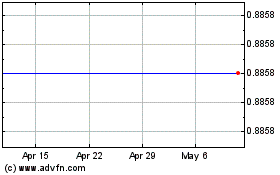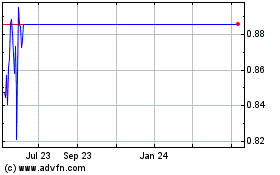By John Letzing
ZURICH-- Credit Suisse AG executive Iqbal Khan was talking to an
anxious client earlier this year, while the Swiss banking giant was
weathering a difficult transition.
"What are you guys doing--are you guys stable?" the client
asked, according to Mr. Khan.
It was the sort of question coming up frequently in relation to
Credit Suisse. The lender was in the process of a broad strategic
shift under new Chief Executive Tidjane Thiam, amid a series of
quarterly losses, publicized infighting and a tumbling share
price.
That was taking place against a backdrop across the banking
sector of negative interest rates, heightened regulation and a grim
investment outlook.
Credit Suisse has since begun to find its footing under Mr.
Thiam, a former insurance executive.
Still, doubts linger about whether the lender can hit the profit
targets outlined in its CEO's strategic plan, which was unveiled
one year ago.
"They were too optimistic on the market when they drafted their
strategy, " said Baader Helvea analyst Tomasz Grzelak.
Mr. Khan, who was named CEO of the bank's international
wealth-management unit as part of Mr. Thiam's revamp, said two
dreadful quarters following the strategic plan's disclosure didn't
help. But he said morale endured: An internal survey of some of his
senior staff last August showed 70% believed the unit would hit its
targets. "I'd have never expected to see 70%," Mr. Khan said.
Investors have begun showing some faith, too.
Credit Suisse's stock price, which slid below 10 Swiss francs
($10.11) in the summer--the lowest in decades--has recovered to
more than 13 francs a share, aided in part by a
better-than-expected second-quarter profit. But the stock remains
down about 40% since Mr. Thiam's revamp was unveiled on Oct. 21,
2015. The Stoxx Europe 600 Banks index has declined about 20% over
the same period.
A cornerstone of Mr. Thiam's plan, a priority shift away from
relatively volatile investment banking to wealth management, has
won praise from analysts and investors who like the idea of the
historically more stable, fee-based business of managing portfolios
for wealthy clients.
But the timing proved unfortunate. Markets grew more risk-averse
after Credit Suisse disclosed its new direction, as did
wealth-management clients. It suddenly became more challenging to
sell off chunks of the investment-banking business. The shift also
meant moving the bank's center of gravity from the
investment-banking hub of New York back to Switzerland, alienating
some U.S.-based investment bankers.
Thomas Gottstein, a longtime Swiss executive at the bank, spent
years wondering if Credit Suisse would re-embrace its local roots.
"The Swiss business was treated as a cash cow" that funded other
businesses in the past, Mr. Gottstein said. Now, as part of Mr.
Thiam's revamp, Mr. Gottstein oversees the still-forming Swiss unit
as a member of the bank's executive board.
The effort to cobble together the Swiss unit, expected to be
completed next month, will cost 200 million francs this year alone.
Its final shape remains unclear: It may ultimately include 7,000
employees, or 10,000, depending on which staff members are
included.
The prospects are just as fuzzy for the planned partial initial
public offering of the bank's Swiss unit before the end of next
year, which could bring precious capital.
An offering could net as much as 4 billion francs for Credit
Suisse. A separate capital raising last year brought in 6 billion
francs, which Mr. Thiam has said gave the bank a "fighting chance"
at its turnaround.
Despite pressure on Swiss banks from low client activity and
higher compliance costs, Mr. Gottstein anticipates investor
appetite for the partial IPO.
According to the bank's strategic plan, Mr. Gottstein's Swiss
unit is expected to increase annual pretax profit from 1.6 billion
francs in 2014 to 2.3 billion francs by 2018. He said the unit is
"on the right track" to hit the target. Mr. Khan's business is also
expected to significantly boost pretax profit by 2018, which he
said will be "challenging" but manageable.
Doubts persist about those goals. "I think an update there is
going to be necessary," said Vontobel analyst Andreas Venditti.
The bank faces other challenges, including an expected
settlement with U.S. authorities over the selling of financial
crisis-era mortgage securities. Analysts generally expect Credit
Suisse to settle for about $2 billion.
Still, there are positive signals. The investment bank unit that
advises companies on mergers has won recent deals including Bayer
AG's $66 billion purchase of Monsanto Co., even as the trading unit
has receded. Jim Amine, who leads the advisory unit, said it has
thrived under Mr. Thiam: "He's been growing it, he hasn't been
shrinking it."
After spending much of the year in an unwelcome spotlight, the
bank as a whole has received a welcome respite.
Mr. Khan said there was a bright side to some of the recent
troubles: They presented an opportunity to engage with
customers.
The anxious client asking him about the bank's stability earlier
this year, Mr. Khan said, has since committed more of his assets to
Credit Suisse following those discussions.
"He felt we were being honest, and transparent," Mr. Khan
said.
Write to John Letzing at john.letzing@wsj.com
(END) Dow Jones Newswires
October 20, 2016 10:25 ET (14:25 GMT)
Copyright (c) 2016 Dow Jones & Company, Inc.
Credit Suisse (NYSE:CS)
Historical Stock Chart
From Aug 2024 to Sep 2024

Credit Suisse (NYSE:CS)
Historical Stock Chart
From Sep 2023 to Sep 2024
